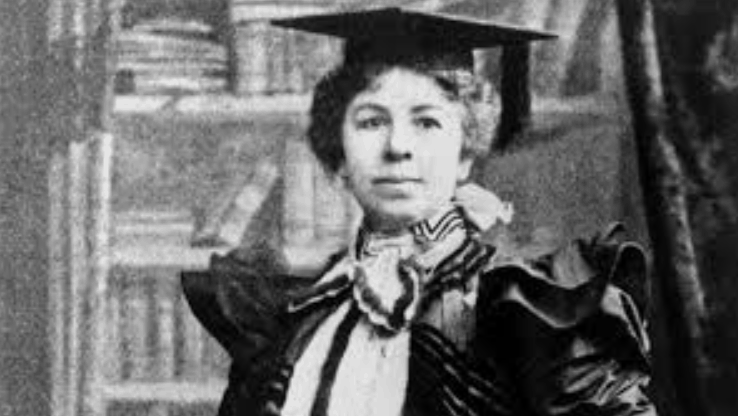Even though she was born in the middle of the nineteenth century, Clara Shortridge Foltz’s life may not have been dissimilar from some women today. She was a mother and career woman; she ignored barriers; and she had the courage to achieve in areas where there were no models for her to follow.
Born in Indiana, she moved with her family to Iowa during the Civil War. When she was fifteen, she eloped with a man who had difficulty supporting his family. He took her to Portland, then to San Jose. She kept body, soul, and family together by writing letters to The New Northwest and articles for the San Jose Mercury. Her husband finally deserted her and she became the single mother of five children.
In order to support her family, she gave public lectures about women’s suffrage, one of the few avenues for women to earn an income in that time and place. She also “studied” law in the office of a local judge, but when she went to take the bar exam she discovered that the California constitution specified one qualification for admission to the bar that she could not meet. She was not a “white male.” Not one to be deterred, she promptly used her legal training and drafted an amendment to change that language to “person.” She persuaded the legislature to pass the amendment, and became the First Woman admitted to the bar in all of the Western United States.
Wishing to perfect her skill, she applied to Hastings College of the Law, along with her friend Laura de Force Gordon, but they were denied admission. Although they did not have law degrees, they had studied enough law to bring a legal case against the school. They wrote the brief and argued the case all the way to the California Supreme Court. And they won.
In 1893 Foltz spoke to the Board of Lady Managers at the Chicago World’s Fair and proposed a new position for the legal system, that of public defender. This novel idea of providing legal assistance to the indigent is now practiced throughout the country. She also advocated for the separation of juvenile offenders from adults. That same year she organized the Portia Law Club with other women lawyers in San Francisco. Seven years later, in Los Angeles, she became the First Woman deputy district attorney.
In addition to being the First Woman admitted to the bar, and the First Woman deputy district attorney, she also held the following firsts in California:
–the First Woman clerk for the State Assembly’s Judiciary Committee,
–the First Woman appointed to the State Board of Charities and Corrections,
–the First Woman licensed Notary Public,
–the First Woman appointed as director of a major bank, the United Bank and Trust Company of San Francisco, and
–the First Woman to run for Governor of California. (She was 81 years old at the time.)
While not busy racking up firsts, she also founded and published the San Diego Daily Bee, and the New American Woman Magazine. She wrote a monthly column for the magazine until her death at the age of 85.
The women of Hastings College of the Law organized in 1991, and compelled the college to honor Foltz with a Doctor of Laws degree, fifty-seven years after her death. In 2002, the Los Angeles Criminal Courts Building was renamed the Clara Shortridge Foltz Criminal Justice Center, a visible tribute to a legal dynamo.

